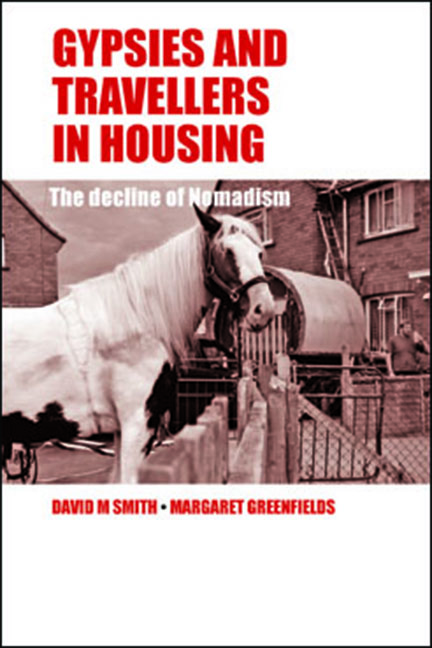Book contents
- Frontmatter
- Contents
- List of tables
- Acknowledgements
- Foreword
- one Introduction
- two Space, surveillance and modernity
- three Gypsies, nomads and urbanisation: a social history
- four The research sites and population sample
- five Routes into housing
- six Housing transitions
- seven Gypsies, Travellers and gorjers: conflict and cooperation
- eight Recreating community
- nine Young people in housing: aspirations, social relations and identity
- ten Conclusion
- Appendix A Methodologies
- Appendix B Glossary of words and terms
- References
- Index
six - Housing transitions
Published online by Cambridge University Press: 03 February 2022
- Frontmatter
- Contents
- List of tables
- Acknowledgements
- Foreword
- one Introduction
- two Space, surveillance and modernity
- three Gypsies, nomads and urbanisation: a social history
- four The research sites and population sample
- five Routes into housing
- six Housing transitions
- seven Gypsies, Travellers and gorjers: conflict and cooperation
- eight Recreating community
- nine Young people in housing: aspirations, social relations and identity
- ten Conclusion
- Appendix A Methodologies
- Appendix B Glossary of words and terms
- References
- Index
Summary
The previous chapter highlighted the main routes through which the Gypsies and Travellers interviewed in the different locations included in this study arrived in housing. While a degree of autonomy could often be exercised in relation to neighbourhood (see Chapter Eight), for many the move into housing was experienced as a severe limit on individual agency and an attendant diminution of accustomed lifestyle. As noted in Chapter One, fundamental and rapid changes in one's social landscape can impact traumatically at a group level, and ‘supply the prevailing mood and temper, dominate its imagery and its sense of self, [and] govern the way that members relate to each other’ of a collectivity (Erikson, 1995, p 190). At the individual level, such transformations may constitute a ‘blow to the psyche that breaks through one's defenses so suddenly and with such brutal force that one cannot react to it effectively’ (Erikson, 1995, p 187). This chapter addresses the participants’ experiences of moving into housing and the multi-layered sets of concerns that must be addressed when moving into what is frequently an alien type of accommodation while simultaneously having to deal with an unfamiliar and foreign set of circumstances.
Bennett (1998, p 215) notes that ‘culture shock’ refers to the ‘anxiety that results from losing all of our familiar signs and symbols of social intercourse’. This anxiety arises due to the loss of perceptual reinforcements from one's own culture and exposure to new stimuli which can be disorientating in terms of disruption to familiar cultural patterns. The concept is pertinent in understanding the transition from sites or the roadside into housing, which also involves a deeper-rooted transition from a cultural framework that emphasises a ‘we’ consciousness, collective identity, emotional dependence and group solidarity towards one premised on an ‘I’ consciousness defined by emotional independence, individual initiative, the right to privacy and personal autonomy (Kim, 1995, p 4).
Our adaptive processes fail to meet the needs of the moment, and we find ourselves overwhelmed by the stimuli we are forced to assimilate. Therefore, if transition shock is a state of loss and disorientation precipitated by a change in one's familiar environment that requires adjustment, then culture shock may be characterized as transition shock in the context of an alien culture. (Bennett, 1998, p 216)
- Type
- Chapter
- Information
- Gypsies and Travellers in HousingThe Decline of Nomadism, pp. 109 - 132Publisher: Bristol University PressPrint publication year: 2013



